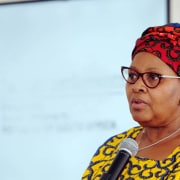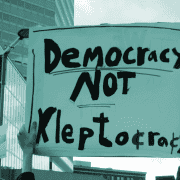|
Getting your Trinity Audio player ready...
|
By Kavisha Pillay
First published on Daily Maverick
Over the past five years South Africa has made significant strides in addressing corruption in the country. We appointed new heads to law enforcement agencies. We established new bodies such as the Investigating Directorate, the Special Tribunal and the Fusion Centre. A commission of inquiry into State Capture sat for four years, producing a lengthy account of how the state was held to ransom by different syndicates linked to politicians.
We introduced new legislation aimed at curbing corruption, such as the Political Party Funding Act and the Municipal Systems Amendment Act. We remain signatories to regional and international anti-corruption treaties.
Additionally, we have finalised and released a National Anti-Corruption Strategy (Nacs), with a nine-member presidential advisory council appointed to support and oversee the implementation of the Nacs.
So, why does it still feel like we are losing this battle?
The recent Corruption Perceptions Index revealed that despite our endeavours, we have now dropped to 43/100 – our lowest score since 2013. We are on the Financial Action Task Force’s grey list for failing international standards in terms of combating money laundering and other serious financial crimes, and persistent rolling blackouts due to rampant corruption and organised crime at Eskom has made the current situation untenable – with no real political solutions emerging to address the problem.
Choosing to behave with integrity is revolutionary
Perhaps naïvely, as a society, we are waiting for a silver bullet that would eradicate all corruption in South Africa. A new institution maybe? A new president? A new law? A new ANC? The old ANC? A new political party? A regime change?
Unfortunately, given the nature and extent of South Africa’s corruption problem, all of these can be seemingly shallow fixes if we don’t recognise that to shift the scales on corruption, the vast majority of people need to keep their hands clean.
At a recent meeting of anti-corruption experts, renowned criminologist and academic Professor Chris Stone outlined five traps that we should avoid when fighting corruption – one of them is the urban legend that we, or any nation, can truly build a corruption-free society.
Stone argued that there will always be some among us, usually in positions of authority, who will engage in self-preserving behaviours, and so the idea that we can totally root out corruption is a fallacy. Nevertheless, corruption can be massively reduced with political will, policies and institutions and, indispensably, the development of a society-wide culture of integrity.
Through the Nacs and the implementation of the recommendations from the Zondo Commission, we are likely to see legislative reform and the establishment of a new permanent anti-corruption agency.
However, what is clearly missing from the South African response to fighting corruption is emphasis by all actors on the importance of building a culture of integrity. Not the Sunday-morning religious type of integrity, nor the political grandstanding type.
We need personal integrity, where individuals question and account for their daily actions. Where they are conscious of the harms that their actions may cause, confront their own willingness to bend the rules for their own personal gain, and deal with their “smallanyana” skeletons.
In times like these, choosing to behave with integrity is revolutionary. It requires self-reflection, honesty and taking responsibility for your actions. It recognises that you are only human, and bound to make mistakes – but that you are willing to learn from them, grow and avoid those mistakes in future.
It goes to the core of who you are, your values, and how you will intentionally incorporate your values into your daily life and actions. Integrity is doing the right thing, even when no one is watching.
Having integrity is a personal choice – it is a hard choice, but ultimately once worth making. Not because of any rewards in the afterlife, if you believe in that, or good karma in the next life, if you believe in that. But, because in this present moment, if more people committed to living with integrity, we could see tangible shifts in contributing to a more just world.
Fighting corruption is everyone’s responsibility
Is integrity a potential antidote to corruption? Yes. A silver bullet? No.
We do need systems, laws, policies and institutions to guide us in combating entrenched and complex networks of corruption and organised crime. But we also need people with integrity building those systems, implementing those laws and leading those institutions.
I recognise that this is perhaps easier said than done. Upholding ethical principles can be difficult in a world where external pressures and incentives can push individuals or organisations towards corrupt behaviour. This is particularly true in South Africa, where corruption is so widespread that many engage in corrupt activities as a necessary means for survival.
But we should never accept that we are terminally corrupt as a society. Change is possible. It can start with me. It can start with you.
The promotion of integrity is essential for combating corruption and promoting good governance. It is a difficult and complex task, but one worth pursuing if we hope to change the status quo on corruption. By upholding ethical principles and promoting transparency and accountability, individuals, organisations, businesses and governments can help create a culture of honesty and trust that is essential for the functioning of a healthy democracy.
So, make the commitment, to yourself and to others. Uphold integrity and ethics in all aspects of your life. Act with honesty and be fair. Strive to do what is right, even when it is difficult. Hold yourself accountable for your decisions and the consequences thereof. Stand up to corruption. Lead by example.
And commit to contributing to a society that is just, equitable and ethical.








